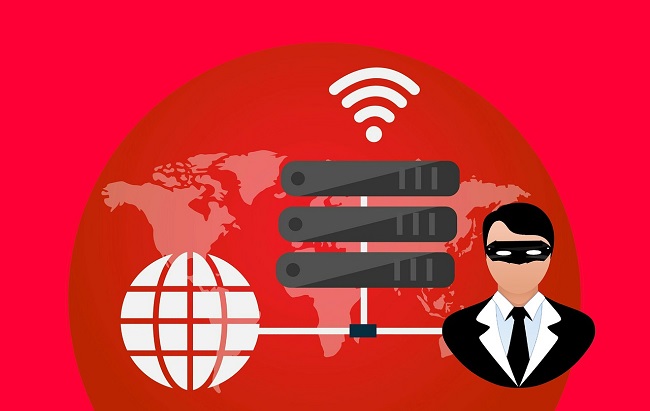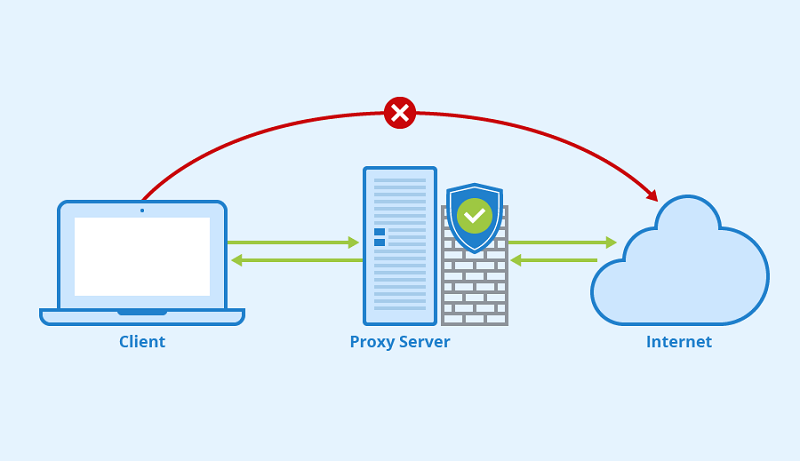As we all know, whenever we visit a website or connect with someone online, our internet connection gives the computer address or IP address to the site or a person you are connecting with. However, many people are not comfortable with their information being shared on the internet, so there are a few things one can do to make it more difficult to link the public IP to your other personal information directly. A solid first step is to use a proxy service or proxy server.
Contents
What Is A Proxy Server?
The word proxy means “substitute.” And a server is a system that provides resources or data to another computer known as a client. So a proxy server is an intermediary server that acts as a gateway between the user and the internet. Proxy servers provide different functionality, security, and privacy levels, depending on your use and security policies.

If you are using the proxy server for the first time, then the internet traffic (which is a flow of data within the entire internet or in certain network links of its constituent networks) flow through the proxy server on its way to the address you requested.
After that, the request then comes back through the same proxy server, and then the proxy server forwards the received data from the searched website to you.
Read Also:
So now, the question arises: why do we need a proxy server as a mediator between them, Why not just go straight to the website and come back?
As we saw earlier, proxy servers act as a gateway between the user and the internet, so apart from forwarding web requests, it also serves as the data security and network performance. Proxy servers also act as a firewall and web filter and provide shared network connections and cache data to speed up common requests.
And the use of a good proxy server keeps the user and internet network protected from the awful stuff available in the wild internet. As discussed earlier, proxy servers provide a high level of privacy so the user can comfortably access the internet for their use.
How Does Proxy Server Works?
On the internet, every computer requires a unique Internet Protocol (IP) address. For example, a post office that sends your post as soon as your address will be known, just like that internet knows how to send the correct data to the correct computer with the help of an IP address.

Apart from all this, a proxy server is basically a computer on the internet with its own IP address that the user’s computer knows.
So how it works:- it works as when a user sends a web request, then the request goes to the proxy server first, and then the proxy server makes the web request on your behalf and used to gather the response from the webserver, and then it forwards the web page after completing all the steps, and now you can see your page in your browser.
Whenever the proxy server passes on the web request, it has the chance of making changes in the data you send, but you still get to see your expected information. There is an advantage of proxy servers that it can change your IP address so that the webserver doesn’t know your location. Proxy servers can also block access to certain web pages, based on your IP address.
Why Should You Use A Proxy Server?
There are many reasons for which organizations or individuals should use a proxy server; the reasons are as follows:-
1. Control Internet Usage of Employees and Children
Proxy servers had a major role among organizations and parents; they set up this to keep an eye on their employees or children who use the internet. Most organizations don’t want their employees to look on the specific website on their working time. By the help of a proxy server, they can deny access to specific sites with this they can also monitor and log all web requests, so even the sites are not blocked they will come to know that how much time you spend in cyberloafing.
2. Bandwidth Savings and Improved Speeds
With the help of proxy, server organizations can have better network facilities, proxy servers can also save a copy of the website locally of the popular website, so whenever you ask for solutioner.pro, then the proxy server will go to check if it has the most recent copy of the site or not and then send the user the saved copy.
Now the question arises: what will happen if hundreds of people visit solutioner.pro simultaneously from the same proxy servers, then the proxy server will send only one request to solutioner.pro. This helps to save bandwidth for the company and also improves the performance of the network.
3. Privacy
For more private usage of the internet, organizations use the proxy server. Some of the proxy servers would change the IP address, and others will identify information in the web request. By this, the destination would never understand who literally made the original request, which helps keep the personal information and browsing habits more private.
4. Security
As we have seen earlier, the main use of proxy servers is to provide security benefits. You can also arrange your proxy server to encrypt your web request so that you can keep inquisitive about your transitions.
You can also protect your transitions from malware sites with the help of a proxy server. organizations also have the write to couple up the proxy server with the help of (VPN) which is a virtual private network, so the remote users always access the internet with the help of a proxy server.
By means of VPN, the company would have the control and also use the safety measures in verifying that their users have resources like emails, internal data, and by this, it can also provide a secure connection for the user to protect the data of the company.
5. Access to Block Resources
Proxy servers allow the users to circumvent content restrictions that have been restricted by the companies or governments. so, is the local sports ball team blacked out online? for this, log into a proxy server on the other hand and watch from there.
As proxy servers change the IP address of the users so it would look like you are from California, but you are not. Many governments around the world would closely monitor and restrict the access of the internet, and proxy servers would offer the citizens access to an uncensored internet.
These given points tell us why we should use proxy servers, and now we should take a look at the risk below.
Proxy Servers Risks
After the reading the usage of proxy server, we should also know the risks of proxy server that negate any of the potential benefits:-
1. Free Proxy Server Risks
As we all know, the old saying that “You get what you pay for?”, so using one of the many free proxy server services may be quite risky, as the services using an ad-based revenue model.
Free always means that they aren’t inviting heavily in backend hardware. by using this, you would likely see issues of performance or potential data security issues. If you found a completely free proxy server, then please use it carefully; some would just steal your private information like your credit card number.
2. Browsing History Log
Your proxy server has your private information such as your IP address and web request information, so make sure you check whether your proxy server logs and saves the data, and you must check what kind of law enforcement cooperation policies follow.
If you need a proxy server for your private usage, you come to know that it is just logging and selling your private data, and you can receive the expected values of the services.
3. No Encryption
If you are using a proxy server without the encryption, that you should use the proxy server. No use of encryptions means sending your requests as a plain text. Anyone who is operating will easily hack your account by your username and password, and it can get your account information very easily if you do not use encryptions. so make sure that any proxy server you are using should provide full encryption capability.
Types of proxy servers:
Now after reading the usage and risk of proxy servers, we should now see the different types of proxy servers, as all the proxy servers don’t function exactly the same, the following are the types of proxy servers.
1. Transparent Proxy
A transparent proxy is to tell the website that it is a proxy server, and it will pass along the IP address in the webserver. Transparent proxies are often used in businesses, public libraries, and schools for content filtering and which is easy to set up both the client and server-side.
2. Anonymous Proxy
The use of an anonymous proxy is to identify itself as a proxy. Like a transparent proxy, it won’t pass the user’s IP address to the website; this helps protect from any kind of theft and keep your browsing habit private. They also protect websites from serving the user-targeted marketing content based on your location.
For example, if CNN.com knows that you live in Raleigh, NC. So with the help of an anonymous proxy, you can protect your website from using some ad targeting techniques, but it doesn’t give a 100% guarantee.
3. Distorting Proxy
The use of a distorting proxy is to pass a false IP address for your whale identifying itself as a proxy. it is like an anonymous proxy, but bypassing a false IP address, you can appear to be from a different location to get around content restrictions.
4. High Anonymity Proxy
The use of a high anonymity proxy is to periodically change the IP address that they present to the web server, making it very difficult to track what traffic belongs to who. High anonymity proxy, like the TOR Network, is the most private to surf the internet.
Read Also:
Conclusion
So this is about proxy servers, how they operate, and risk from them and their type. I hope this information will help you to access your internet more safely.
Thank You very much for taking the time to read this article.























